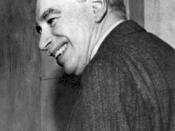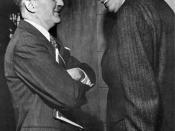On July 1, 1944, World War II, perhaps the darkest age of the human race, was about to end. The allies have landed in Normandy, and the fall of the Axis powers was inevitably near. Already, the economic visionaries and idealists have gathered at Bretton Woods to discuss the future economy of the upcoming peaceful times. After twenty-two days of meeting, twenty-nine participating nations signed the articles of agreement and the International Monetary Fund was established, with its noble goals - to provide a world of economic cooperation, to maintain a fixed exchange rate, to safeguard against any nation's misfortunes and disequilibrium, and to achieve a world economy that would reduce the possibilities of isolationism and therefor, war. Yet, after fifty years of commitment to that noble goal, after providing more than $100 billion dollars to developing nations, the program is facing grave opposition and a possible end to its organization.
Anti-IMF organizations have begun to wage a vicious campaign named '50 years is enough' against the IMF and the World Bank. Did the IMF's service to the world economy have a negative effect? Or is it because the environmental, political, and humanitarian concerns outweigh the positive economic gains of the organization? Or has the rapid advancement of the world economy made the once useful organization's services obsolete? A closer examination of the organization and its workings, its problems, and its opponents positions reveals the answers to these questions.
The International Monetary Fund officially started operating on March 1, 1947. The philosophy behind the organization was mainly influenced by two men: Harry Dexter White and John Maynard Keynes. They were both heavily influenced by main economic and political events of the 1920's and 1930's: the economic depression connected with isolationist policies of the thirties and the rise of...


